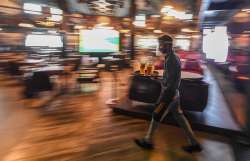Dining in restaurants may increase Covid-19 spread risk: Study
Fro the findings, the research team examined data from adults at 11 facilities across the nation who tested positive for COvid-19 and compared that with a control group of adults without virus infection.

In a study related to novel coronavirus, the US Centers for Disease Control and Prevention (CDC) has found that people who are dining at a restaurant at a higher risk of Covid-19 transmission than some other community activities.
Fro the findings, the research team examined data from adults at 11 facilities across the nation who tested positive for COvid-19 and compared that with a control group of adults without virus infection.
"We found that close contact with persons with known Covid-19 or going to locations that offer on-site eating and drinking options were associated with Covid-19 positivity," said the study researchers from the CDC.
"Adults with positive SARS-CoV-2 test results were approximately twice as likely to have reported dining at a restaurant than were those with negative SARS-CoV-2 test results," they added.
In this investigation, participants with and without Covid-19 reported generally similar community exposures, with the exception of going to locations with on-site eating and drinking options.
The researchers took a close look at how those patients responded to questions about wearing masks and various activities in the community, including whether they recently dined at a restaurant, hung out a bar or went to a gym.
The data showed that 42 per cent of the adults who tested positive reported having close contact with at least one person known to have Covid-19, compared with 14 per cent of those who tested negative.
The researchers also found that 71 per cent of the adults with Covid-19 and 74 per cent of those who tested negative reported always using a face covering while in public.
The findings showed that eating and drinking on-site at locations that offer such options might be important risk factors associated with SARS-CoV-2 infection.
"Efforts to reduce possible exposures where mask use and social distancing are difficult to maintain, such as when eating and drinking, should be considered to protect customers, employees and communities," the study authors noted.